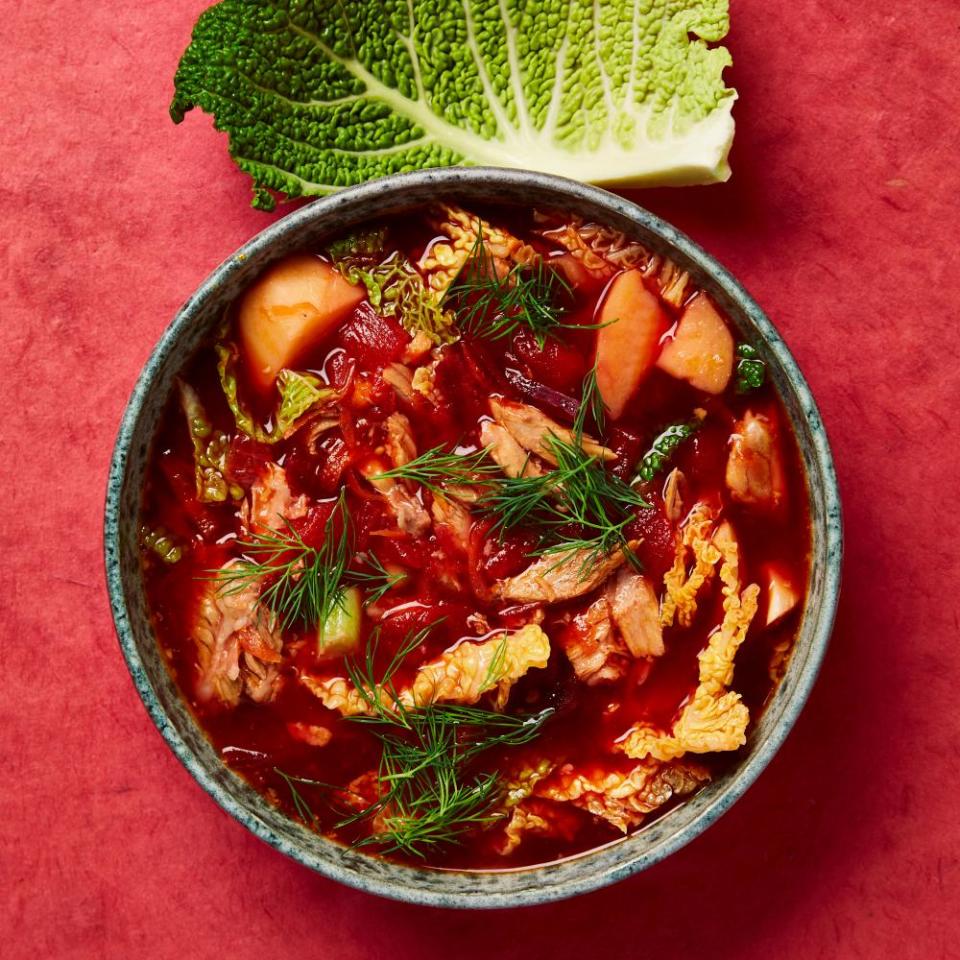Papushka’s borscht by Olia Hercules

My father is an often slightly eccentric, but excellent cook. When my son was born, him being half Thai, my dad decided that adding Asian ingredients to Ukrainian food was the way to go. He made a borscht and added a bruised chilli (which isn’t that out of the ordinary for Ukrainian borscht), but he added ginger too, which added gentle warmth to the whole affair. He usually uses pork ribs, but you can use anything at all – beef or pork bones, chicken carcasses and even giblets that you may find in your freezer work, just make sure to take the liver out. For a veggie option, make a dried mushroom stock.
Serves 4
pork ribs 2kg
onions 2, peeled
carrots 2 medium, scrubbed, 1 roughly chopped and 1 grated
celery 2 sticks, chopped
bay leaf 1
allspice berries 10
peppercorns 10
salt
beetroot 2 medium, peeled and julienned
chopped tomatoes 1 x 400g tin
red chilli 1, bruised with the side of a knife
potatoes 4 small, peeled and cut into 8 wedges, or ½ celeriac, peeled and diced
savoy cabbage ¼, sliced
garlic 2 cloves, peeled and finely grated
ginger 5cm knob, peeled and finely grated
chopped dill 2 tbsp
Put a large pot of cold water on, around 4 litres. Drop in the carcasses or giblets and one of the onions, sliced in half, followed by the celery and the roughly chopped carrot. (Really, you can use any stock vegetables you have at home, or none at all.) Add the bay and spices and bring everything to the boil. Skim and discard any froth. Season gently with salt and cook over the lowest heat possibly for about 1.5 hours. If it is evaporating too fast, top up with cold water.
Meanwhile, skim the top of the stock with a ladle. You are collecting the fat – do not discard it! Pour it into a large, deep frying pan and let the extra water sizzle off, leaving you with just the fat. Dice the other onion and add it to the frying pan. Cook it over a medium heat until it starts turning golden. If it goes too dry, add some more fat from the stock. Then add the grated carrot and cook some more until the carrot is also soft. Then add the beetroot and cook for another 3 minutes. Finally add the tinned tomatoes and bruised chilli and season well with salt and pepper.
Strain the stock into a large bowl, discard the veg but add the meat back in – if the ribs are properly falling apart, get rid of the bones – and pour it all back into the pot. Add the frying pan contents into the stock along with the potatoes or celeriac. Cook for 5 minutes, then add the cabbage. It is done when the potatoes or celeriac are cooked, but not too soft.
Make sure you taste for seasoning, then add the grated garlic and finely grated ginger at the very end. Serve with plenty of dill or your favourite soft herbs.
Olia Hercules is a chef and food writer

 Yahoo Finance
Yahoo Finance 